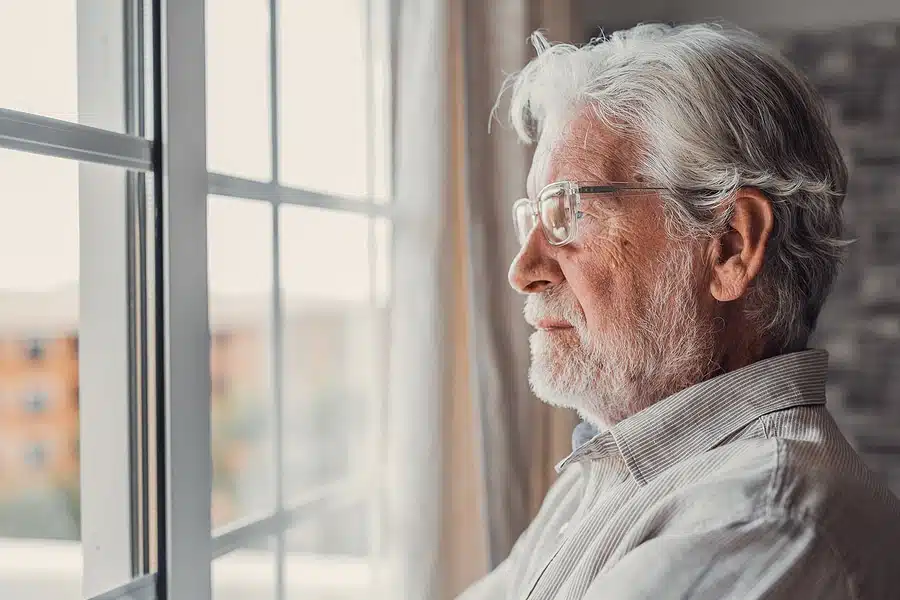Why The Middle-Aged Are Feeling More Lonely Than Ever

The most striking aspect of the analysis of loneliness is that middle-aged people report feeling isolated more than any other age group.
One in seven people between the ages of 45 and 55 suffers from loneliness, according to the Office for National Statistics.
How Concerning Is Loneliness In Middle Age?
I do believe that loneliness, particularly in the middle-aged is serious. Is it a real concern? Absolutely.
Let’s look first at loneliness in middle-aged women
As a woman in your 50s or 60s, you may feel that no one understands you or your struggles, nor take the time to try and comfort or support you, regardless of their level of understanding.
Loneliness comes in many forms and looks very different for every woman. Some women are completely socially isolated and have very little connection to other people.
While other women are surrounded by others, yet they feel very alone, misunderstood or neglected.
Whatever form loneliness takes for you, know that it is a very common issue in midlife and your feelings are valuable and important.

This particular struggle is real for women and it occurs for various different reasons. As we step into our 50s, our lives seem to begin this strange spiral into a weird twilight zone of change, loss, concern and uncertainty.
The role that children can play in our loneliness
For those of us with children, we’re suddenly forced to accept a diminished role in our children’s lives.
They’re growing up and they’re living their own existence now. The mother routine that we grew so accustomed to, is all of a sudden gone.
Leaving not only a huge emptiness in our daily routine, but a huge hole in our hearts and maybe even a drop in our self-worth – because our children suddenly don’t need us the way they used to anymore.
As a result, we’re also not meeting up with other mothers anymore for kid-related activities. So our connection to other mothers drops considerably.
Losing Connection With Friends Can Be Another Problem
Our other friends are now busy with their own careers and families and busy lives. So catching up and connecting with them also becomes a very big challenge at this stage.
Also at this stage of life, and I’m sure most of you have noticed, women’s hormones have decided to take a permanent vacation from functioning optimally.
I’m sure some of you can relate. And maybe you feel like everyone is looking at you like you’ve completely lost it.
You are literally struggling every single day by yourself. And that is a very lonely and isolating experience.
Maybe you’re one of those women who’s having such a miserable experience, both physically and mentally, that it’s caused you to cancel on the friends that you do have on more than one occasion.
Now they just don’t invite you out as often as they used to.
Maybe you’re one of those women dealing with ageing parents or long hours at work. And you don’t have the time you once had for socializing.
You’re alone and lacking the comfort and support that you need to help you deal with everything that you have on your plate.

Whatever your situation or reason is for your struggle with loneliness, isolation, or feelings of being invisible or unsupported, know that this state of being in midlife is very, very common for women.
It’s so common, in fact, that it seems to me there are so many women out there suffering in silence with no one to talk to or understand them
Who better to understand daily battles and struggles, than other women who are suffering similar issues?
How relieved we should be to know that other women are suffering with similar issues and that we’re not alone in this.
Human connection is vital to us as human beings. We need to be around other people to feel validated, accepted, understood and loved.
If you are feeling lonely, isolated, misunderstood, or unsupported, and you don’t have the opportunity to connect with others, please consider a support group.
Online support groups can be a lifesaver, but they can never replace physical human connection. We need to be there for one another.
Let’s help build each other up and help each other feel important, valuable, and understood so that we can all achieve the most fabulous lives imaginable. We all deserve that.
How Loneliness Impacts Middle-Aged Men

Studies say one in five men, fall into isolation when they let friendships lapse. Loneliness in middle-aged men is serious. It’s a real concern.
As a man in my 50s, a lot of times I find my purpose through my friendships with others. But friendships require cultivation, just like a garden.
Life-changing events like death, divorce, or job loss, often trigger isolation, and more often in men than women.
It’s well understood that women are much quicker to pick up the phone, much quicker to have lunch, much quicker to sit and talk face-to-face.
Men’s tendency to ‘bottle it up’ is probably one of the worst choices they can make… and compounds the feeling of loneliness.
Many men don’t want to admit they’re lonely, because it makes them feel like some kind of loser. You are not a loser if you’re lonely. Far from it.
In fact you are probably one of millions of men, who are middle-aged and feeling this way. The studies clearly show this is a very common phenomenon in men.
Plus, it can often lead to decisions to harm ourselves. Suicide amongst middle-aged men is worryingly high.
Sometimes we think of ourselves as having many friends, but in fact we don’t actually physically see many of them. Perhaps not seeing our friends for months at a time.
And over time, people start to slip away, and we realize the connections start to get somehow lost.
Men also need to reach out to other men and women. And if you haven’t done that, you need to start doing it now. You will feel so much better but you did.
It is like the Nike slogan, ‘Just do it’!
Call somebody up and invite them to do something with you. It’s a connection that may in fact save your life.
The Impact Of Loneliness On Our Health
Long-term loneliness can have huge medical consequences. The effect of social isolation and loneliness on our health is as powerful as things like smoking, high blood pressure, and obesity.
Our physical and psychological well-being, cannot be disconnected – they will always be intertwined.
The more lonely we feel and the more we isolate ourselves, the more our health suffers. Studies show that over and over again.
How a midlife crisis can play a role in this.
The notion of mid-life crisis is generally associated with unfulfilled dreams or a desire for change, but there’s a subtler facet – loneliness. Several factors often contribute to this predicament.
Firstly, the shift in social roles often leaves middle-aged individuals feeling isolated. As children leave home and careers plateau, the opportunities for regular social interaction decrease.
This “empty nest” syndrome can cause a profound sense of loneliness as middle-aged adults struggle to adjust to a quieter, emptier home.
While there is nothing new about this state of midlife resignation, it takes on a new meaning in our age of connected social media.
Our lives are ever more psychologically and economically precarious – the families, homes, jobs and pensions that we look to as guarantees of a secure future, are instead often sources of deep uncertainty.
At worst, it can feel like we’re caught between a regrettable past and a hopeless future.
It is common for middle-aged people to look in the mirror and see someone who failed to fulfill their hopes and dreams. This increases their sense of feeling alone in the world. However, it really should not be the case.

Social Media Is Not The Answer To Loneliness
The ideal remedy may seem to be social media. You can reinvent yourself online; project the person you want to be – if everyday reality has become cumbersome and dull.
A constant affirmation of your value and lovability is (falsely) provided by Facebook and Twitter.
The use of social media does not, by itself, cause loneliness. Yet they are a manifestation of a culture that encourages us to interact in ways that undermine our very sense of security.
Nothing replaces real physical interaction between humans. As we reach our middle age that is even more important. Break away from your computer or phone, and reach out for a real physical connection.
Middle-aged loneliness will not abate as long as we build relationships on the shaky foundation of online relationships, rather than the quality of real human intimacy. Isolation can only lead to depression
So if all this resonates with you in any way, please think of ways that you can make contact with friends or family, perhaps that you haven’t seen for a while.
That can often lead to a healthy pattern of regular meet-ups. And nothing combats loneliness as much as regular human interaction with friends and family.
It can literally be a life saver!





